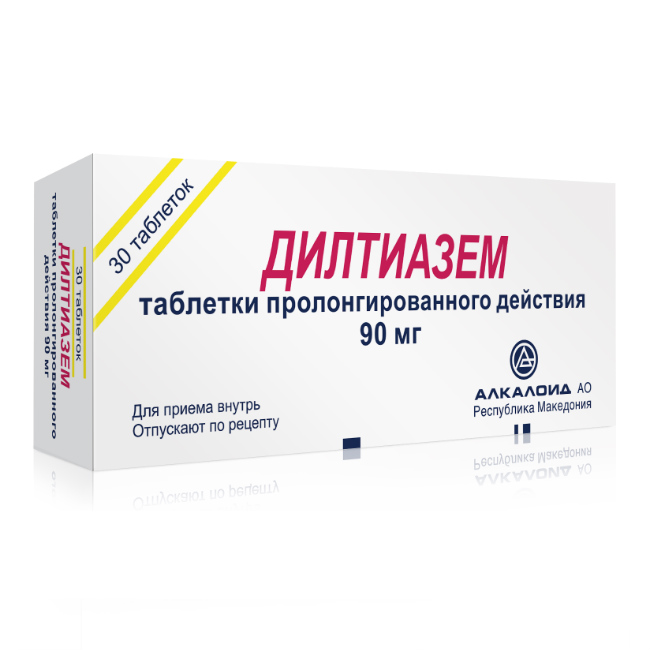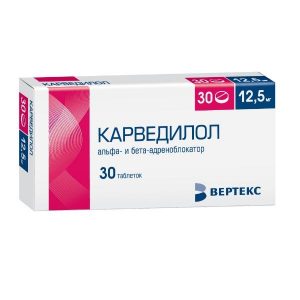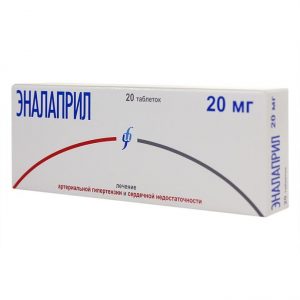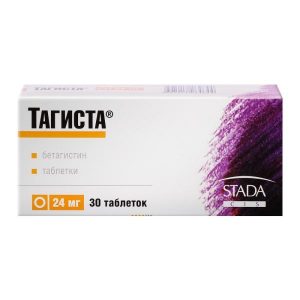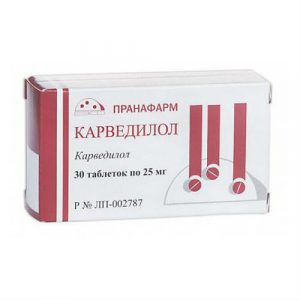Description
Release form
Sustained-release tablets.
Packing
30 pcs.
Pharmacological action
Selective class III calcium channel blocker, benzothiazepine derivative. Diltiazem has an antianginal, hypotensive and antiarrhythmic effect.
Reduces myocardial contractility, slows down AV conduction, reduces heart rate, reduces myocardial oxygen demand, dilates the coronary arteries, and increases coronary blood flow.
Diltiazem reduces the smooth muscle tone of peripheral arteries and OPSS. It reduces the intracellular content of calcium ions in cardiomyocytes and smooth muscle cells of blood vessels, reduces heart rate, can have a slight negative inotropic effect, increases coronary, cerebral and renal blood flow.
In concentrations at which there is no negative inotropic effect, Diltiazem causes relaxation of the smooth muscles of the coronary vessels and dilatation of both large and small arteries.
The antianginal effect is due to an improvement in the blood supply to the myocardium and a decrease in its oxygen demand as a result of a decrease in OPSS, systemic blood pressure (afterload), a decrease in myocardial tone, and an increase in the time of diastolic relaxation of the left ventricle.
Indications
Prevention of angina attacks (including Prinzmetal angina).
Arterial hypertension.
Prevention of supraventricular arrhythmias (paroxysmal supraventricular tachycardia, atrial fibrillation, atrial flutter, extrasystole).
Contraindications
B
Special instructions
Diltiazem is used with caution in case of degree I AV block, intraventricular conduction disorders, in patients prone to arterial hypotension, chronic heart failure, myocardial infarction with left ventricular failure, ventricular tachycardia with expansion of the ORS complex, liver failure, renal failure, in elderly patients, in children (efficacy and safety of use have not been investigated).
Composition
1 tablet contains 90 mg diltiazem chloride.
Dosage and administration
Inside, swallowed whole and washed down with liquid. 60 mg 3 times a day or 90 mg 2 times a day.
The optimal daily dose of Diltiazem is 180-360 mg.
Under stationary conditions, under the supervision of a doctor, the dose can be increased to 480 mg / day.
Side effects of
From the nervous system and sensory organs: headache, dizziness, fainting, fatigue, asthenia, sleep disturbances, drowsiness, anxiety, extrapyramidal (parkinsonism) disorders (ataxia, masky face, shaky gait, stiffness, or stiffness legs, trembling hands and fingers, difficulty swallowing), depression when used in high doses – paresthesia, tremors, impaired vision (transient loss of vision).
From the cardiovascular system: asymptomatic decrease in blood pressure rarely – angina pectoris, arrhythmia (including flutter and ventricular fibrillation), bradycardia (less than 50 beats / min) or tachycardia, AV block II-III art. up to asystole, the development or worsening of heart failure when used in high doses and with iv administration – angina pectoris, bradycardia, AV block, marked decrease in blood pressure, worsening of chronic heart failure.
From the digestive system: dry mouth, increased appetite, nausea, vomiting, constipation or diarrhea, increased activity of hepatic transaminases, gingival hyperplasia (bleeding, soreness, swelling).
From the hemopoietic system: rarely – thrombocytopenia, agranulocytosis.
Drug Interactions
Potentially dangerous are combinations with beta-blockers, quinidine, and other antiarrhythmic drugs of class Ia, cardiac glycosides (excessive bradycardia, slow AV conduction, decreased myocardial contractility with the development of signs of heart failure). Procainamide, quinidine, and other drugs that cause a prolongation of the QT interval increase the risk of its significant lengthening.
May increase the bioavailability of propranolol. Means for inhalation anesthesia (hydrocarbon derivatives), thiazide diuretics, and other drugs that lower blood pressure increase the hypotensive effect of diltiazem. Cimetidine increases the concentration of diltiazem in the blood phenobarbital, diazepam, rifampicin – reduce. Increases the concentration in the blood of cyclosporine, carbamazepine, theophylline, quinidine, valproic acid and digoxin (dose reduction may be required). Possible simultaneous administration of nitrates (including prolonged forms).
Enhances the cardiac depressant effect of general anesthetics. Li + drugs can enhance the neurotoxic effects of diltiazem (nausea, vomiting, diarrhea, ataxia, trembling and / or tinnitus). Indomethacin (and other NSAIDs), corticosteroids and estrogens, as well as sympathomimetic drugs reduce the hypotensive effect.
Storage conditions
Keep out of the reach of children at a temperature not exceeding 25 ° C.
Expiration
2 years.
Dosage form
tablet prolong.
Alkaloid AD Skopye, Macedonia
